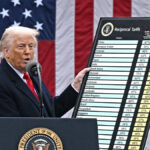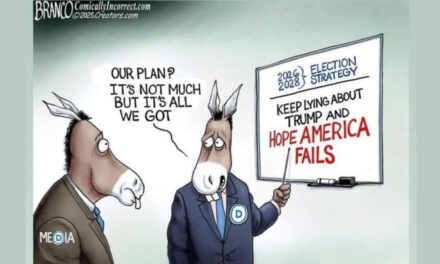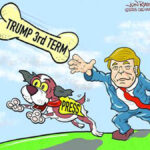
HORIST: Yes, there is a Deep State
During his presidential campaign, Donald Trump referred to it as “the swamp.” Many on the right refer to it simply as “the establishment” or more ominously “the deep state.” In recent weeks, there was a mocking reference to a “secret society.”
There is a philosophic divide on the existence of a permanent government infrastructure. Conservatives see it is a permanent power center run by a powerful but unaccountable elite. Liberals poo-poo such talk as conspiracy theories to be rejected out of hand. They see a strong elitist government as the best means to both provide for the citizenry and protect it from the common folk’s human ignobility.
In fact, there is such an unelected, unaccountable pseudo-branch of government that wields enormous power that is a natural ally to liberal big-government ideology – and therefore, for the liberal-leaning Democratic Party. It is called the bureaucracy.
Democrats portray their allies in the bureaucracy as nothing more than a bunch of hard-working Americans doing a good job without partisan or philosophical biases. This description is not only self-serving and wrong – it is intended to conceal the common interest alliance between the liberal Democrats and the hundreds of thousands of civil servants and patronage workers.
Virtually all federal employees outside the non-commissioned military are liberals. Every study shows that the vast majority of federal workers are liberal democrats. The reasons are obvious. At every level, it is in their personal interest to increase their salaries and benefits, to expand their budgets, to build bigger staffs and to acquire more power.
It does not matter even if they were initially appointed by Republicans, are registered Republicans or vote Republican. They are mostly liberal or so-called moderate Republicans. They may embrace a pro-life position or support school choice, but they are almost never conservative in anything that limits the power and reach of the federal government.
The bureaucracy is not merely a collection of federal workers. They are a fourth branch of government – arguably the most powerful branch. Under regulatory powers, they impose many more laws (regulations) than enacted by Congress. It is not uncommon for such regulators to ignore the intent of the laws passed by Congress and signed by the White House when promulgating regulations.
Though the declared resistance of the left to the Trump presidency is unusually open, it is not new. The bureaucracy has been fighting against elected officials dedicated to reducing the scope and expense of the federal government since the Republic was founded. I saw this close up when the White House put me on temporary assignment to the Office of Economic Opportunity shortly after the inauguration of President Nixon. The knee-jerk resistance to Nixon was telegraphed by the fact that many of the traditional photographs of the President were hung upside down in prominent locations within the offices of the OEO – some were used as dart boards. It was not just symbolism. Directives and even presidential Executive Orders were often ignored.
The power of the early bureaucracy was initially limited by culture and policy. Presidents had hiring and firing power over Executive Branch workers – the branch of government that employs most federal workers. Most non-policy federal workers stayed on even as administrations changed. That is until President Andrew Jackson, at the encouragement of his Vice President Martin Van Buren, imposed a patronage program that earned a derogatory reputation as “the spoils system.” As bad as the Jacksonian approach may have been, at least those bygone federal employees were allied to the programs and policies of the elected President.
The American bureaucracy gained greater power under President Ulysses S. Grant and progressive big-government Democrats when they enacted the Civil Service Commission to protect federal employees from being arbitrarily replaced by the President. It was designed to cover all those non-policy jobs – typists, clerks and other office workers. It was promised that the all-important policy jobs would remain at the discretion of the President.
Through a succession of compliant liberal Presidents, civil service was expanded to senior level management position. An example of the level to which these permanent positions rise, consider the case of Andrew McCabe who recently stepped aside as the second in command of the FBI (and one-time Acting Director). Despite his high policy-making administrative position, he was protected from removal by an overreaching Civil Service law. In a normal employee relationship, McCabe might have been summarily fired, but as a civil servant that could not happen. Instead, he was allowed to “resign” but remain on the payroll until his retirement allowance reached its maximum.
IN A HEALTHY REPUBLIC, IT IS ESSENTIAL THAT THOSE WE ELECT HAVE THE POWER TO PURSUE THE POLICIES THAT WE THE PEOPLE HAVE CHOSEN THEM TO PURSUE. I put that sentence in all caps to emphasize what is dangerously wrong with a government where the bureaucracy has too much permanent power. It leads to an elitist form of government as in the extreme dictatorships like China and Russia. We have already traveled too far down that road.
The accusations against President Trump and those leveled at some individuals in the FBI leadership expose the problem. Senate Minority Leader Chuck Schumer inadvertently alluded to the perverse power of the bureaucracy when he warned President Trump to not attack the intelligence community – correctly noting that they have endless ways to retaliate. They do, and they have.
As the party that pursues the policies of elitist authoritarianism, the modern Democratic Party can be depended upon to support the growth in size and power of the federal government – the government most distant from the influence of the commoner. The Party’s track record of consolidation of federal power in the hands of fewer and fewer people (mostly unelected bureaucrats), the imposition of more and more federal regulations over states, cities and the average person, and the acquisition of an increasing percentage of American wealth (today’s and the future’s) is beyond refutation.
Without the partisan compliance of the bureaucracy, the Democratic Party would be little more than voices in the wilderness – even with the partisan amplification of the Party’s spin by major components of the compliant news media.
In many ways, the problem is not Trump’s crappy personality – although it has enabled the defenders of the establishment to seem more credible. It was clear in the days following the election, there would be a concerted effort by the left – Democrats, bureaucrats and journalists – to remove Trump from office. Even before his inauguration, a never Trump community formed around a full-fledged resistance. Loyal opposition was replaced by an undemocratic malignancy to reverse an election. Criticism to the point of character assassination was leveled against anyone was deemed to “normalize” Trump in any way. Objectivity was displaced by prosecutorial-style propaganda. There were crazed efforts to somehow block Trump’s inauguration – first calling on electors to violate their sworn duties and then to have the Congress block inauguration. Even before those electors were able to certify the election, the call to impeach was sounded. Never before in American history did a political opposition so boldly and so openly commit to oust a duly elected President of the United States – although the pro-slave Democrats were so repulsed by the election of Abraham Lincoln that they seceded from the Union.
The role of the top officials of the FBI is disturbing. While Democrats defend the agency as apolitical with just good public servants doing their job in a professional manner. That may be true of the thousands of FBI agents and employees devoted to law enforcement, but top leaders in every government agency have political leanings and agendas.
This is clear from the words and actions of such FBI officials as James Comey, Andrew McCabe, Peter Strzok and others. All three of them fell from grace (power) because of perceptions of biased conduct. President Trump fired Comey because he would not announce an end to an investigation of Russian collusion even as Comey assured the President that he was not under investigation and that there was no evidence of such collusion. After more than one year of intense investigation, no evidence has yet surfaced – not officially or by leaks. One should not forget that McCabe had passed that same message to then-White House Chief of Staff Reince Priebus. Comey’s and McCabe’s assurances would seem to be a pretty good defense against the obstruction of justice charge.
While Democrats defend the right of both McCabe and Strzok to have political opinions, it was the depth of their active involvement in the political process vis-a-vis Hillary Clinton that is troublesome. McCabe’s wife had received $500,000 to run for a state senate seat (think about that for a moment) from a major Clinton ally. Whether hyperbole or conspiracy, Strzok’s text communications between him and his paramour and fellow FBI agent showed an extreme Trump bias. The fact that Strzok interviewed Hillary Clinton without putting her under oath and then changed Comey’s final report to delete words that would suggest criminal culpability shows that Strzok’s work was strongly influenced by a biased political agenda.
The recusal of Attorney General Jeff Sessions because of his potential role as a witness to relevant events was the proper course of action. He had little choice. But, why did James Mueller accept the job as special counsel when he, too, was a potential witness. It is significant that he was interviewed by President Trump to be the new FBI director. That conversation is extremely relevant to the President’s frame of mind. While it is largely discarded by the news media, Mueller’s selection of active partisan Democrats to staff his team is notable – a team that included Strzok until his partisan activities were publicly exposed. Democrats say that Mueller should be praised for doing the right thing without explaining that it was those inappropriate actions that necessitated the Strzok removal.
Claiming that President Obama ordered the surveillance (bugging) of the Trump campaign may be a bridge too far. It is clear, however, that White House operatives were using the bureaucracy to support the campaign of Hillary Clinton. If looked at separately, the actions of various individuals within the Obama White House and bureaucracy may seem benign. When seen in terms of the combined effect, there emerges a picture of political skullduggery.
One of the overarching claims of the anti-Trump forces is that the FBI is above politics. This is not true and never has been. They display political amnesia when it comes to the FBI under Jack Kennedy and Lyndon Johnson, when they would hold numerous private meetings with J. Edgar Hoover to discuss cases. It was at Kennedy’s behest that Hoover launched that infamous politically motivated “investigation” of Martin Luther King.
This commentary covered only bits and pieces of the larger role of the bureaucracy in maintaining its role as a permanent government force. They have all the response of a stepped-on rattlesnake when their power is threatened. As one bureaucrat bragged to me in saying “Presidents come and go. Congressmen come and go. But we are here forever.”
Larry Horist is a conservative activist with an extensive background in economics, public policy and political issues. Clients of his consulting firm have included such conservative icons as Steve Forbes and Milton Friedman, and he has served as a consultant to the White House under Presidents Nixon and Reagan. He has testified as an expert witness before numerous legislative bodies, including the U. S. Congress and lectured at Harvard University, Northwestern University, Florida Atlantic University, Knox College and Hope College. An award winning debater, his insightful and sometimes controversial commentaries appear frequently on the editorial pages of newspapers across the nation. He can be reached at lph@thomasandjoyce.com.



























TOM: actually "Barack the magic negro" is both racist and your words. Look above in your post. There it is.…
Larry callously overlooks the rule of law in this and determines the word of police officers, one who was fired…
If Trump has something that is off physically or mentally would he publish his ailments? Not a chance. At age…
Not much interest in your trashing attempt at Democrats by way of Kamala Harris's uncharted political future and opportunities. As…
Larry, after 9 years of Trump and you still defend him and appear to admire his pugnacious narcissism because he…